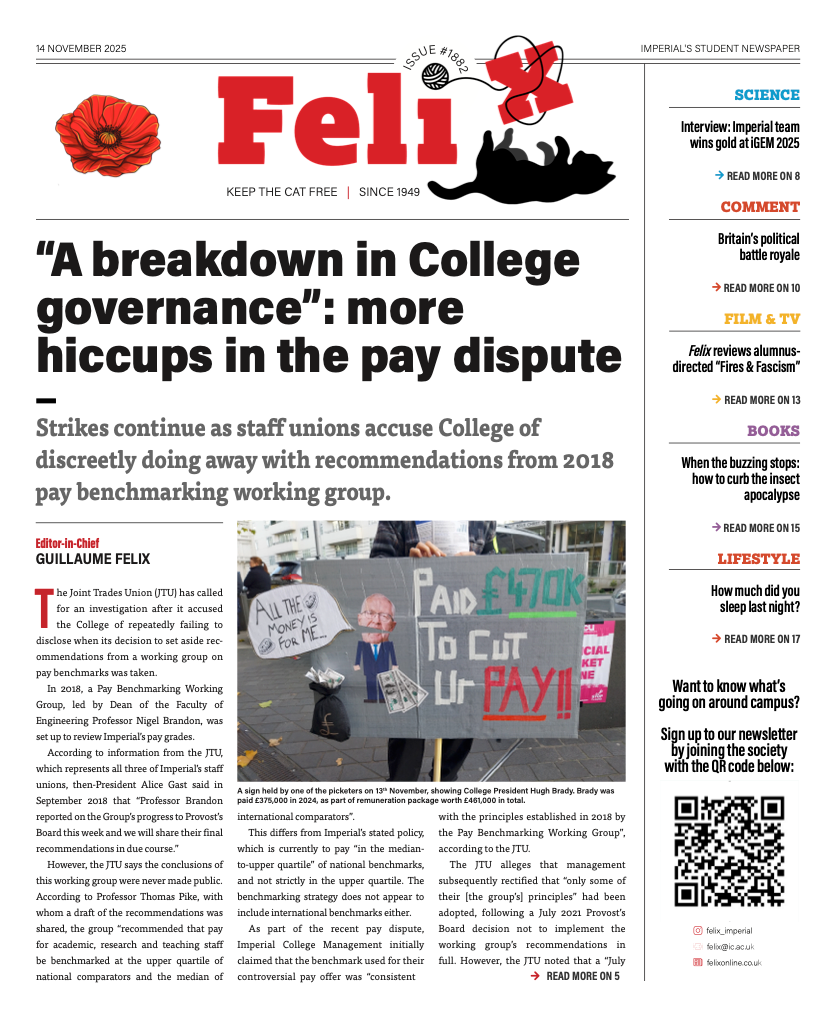International fees: short-term manna, long-term trap.
The UK government seems determined to enact a 6% “levy” (more polispeak to avoid the electorate-angering “tax”) on international fees, which would, according to the Imperial President Hugh Brady, cost Imperial an estimated £26 million to the College. “We have lobbied hard against this and will continue to do so,” Brady said in mid-October.
I commend him for that, because this levy is set to be a disaster not just for Imperial, but for the higher education sector as a whole. The Home Office itself estimated the policy would immediately result in a yearly reduction of around 14,000 overseas students nationwide, while the Higher Education Policy Institute (HEPI) found that it would come at a cost of £621 million across the higher education sector.
Brady said Imperial would not raise overseas fees by an equivalent amount, for which I commend him again (although I will believe it only when I see it). But Imperial is a uniquely moneyed institution that can afford to absorb some taxation whims; across the higher education sector, however, the levy will most likely translate into a 6% fee increase.
The purpose of the levy is ostensibly to fund maintenance loans targeted to low-income students – a sensible proposal, without a doubt. Some suspect more political motives: an acquaintance speculated that with this move, Starmer was making universities more dependent on international fees, thereby limiting a future Farage government’s room for manoeuvre when it comes to anti-immigration policies. Hum.
Whether the intentions are political or not, British universities are now financially chained to international fees. According to HEPI, the English higher education sector receives £10.3 billion a year in overseas fees, with universities like Imperial, UCL and LSE receiving more than three-quarters of their tuition income from internationals.
A dazzling sum, isn’t it? A godsent stash for universities... and a financial nightmare for internationals. For those not blessed with a “beautiful bloo” passport at birth, the price to pay for a single year of an Imperial degree currently hovers around £41,000. That’s £123,000 for a whole three-year degree (although the sum is adjusted yearly for “inflation”, mind you).
Not only is this a ridiculous amount of money to ask of anyone for ten hours of lectures a week, it creates unhealthy dynamics within the student body. Some of Imperial’s national societies increasingly look like jet-set reunion parties, where millionaires from around the world greet their high school friends.
In the long term, the British economy won’t benefit from this, because, surprise surprise, wealthier people aren’t always smarter. High fees are obviously a huge barrier to letting the sharpest minds into the country. Rich kids dropping a hundred grands in the UK before zooming back home (it’s not like graduate visa system is particularly welcoming) is not how you overcome the FT’s periodical “UK economy unexpectedly contracted by X.X% in [Month]”, either.
High fees will also erode the country’s soft power. A “British education” is a sought-after label and the dream of children and parents all over the world. It is now at risk of becoming a pay-to-win tinsel.
What’s more, a dependence on foreign students is a dependence on foreign powers. Earlier this month, it was revealed that a human rights researcher from Sheffield Hallam University (SHU), Professor Laura Murphy, was unexpectedly asked by her institution to stop publishing papers on Uyghur forced labour in China.
Murphy was bewildered, until a freedom of information request revealed that Chinese security-service agents had been pressuring her colleagues in China, and – most importantly in the eyes of the university – blocked SHU’s domain in the country. No internet domain equating to no student applications, this was an open threat to severe one of the university’s most crucial sources of income... and the university folded.
Not a great look for the country that all but invented liberalism and human rights.










